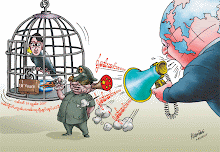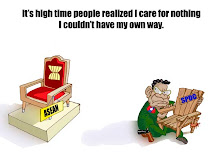Saturday, January 3, 2009
Saturday, October 4, 2008
Eye Doctor Examines Burmese Opposition Leader Aung San Suu Kyi

The party of Burma's detained opposition leader Aung San Suu Kyi says an eye doctor examined the pro-democracy figure at her Rangoon home for one hour this week.
The National League for Democracy said Friday that Burmese authorities allowed the eye specialist to accompany Aung San Suu Kyi's regular physician on a checkup visit Thursday.
Party spokesperson Nyan Win says Aung San Suu Kyi's regular physician Tin Myo Win spent about four hours at her home, where she has been under house arrest for 13 of the past 19 years.
Further details about her condition were not immediately available.
The doctor last visited the Nobel Peace Prize winner on September 14 after her refusal of food deliveries started rumors of a hunger strike.
Nyan Win also said that Aung San Suu Kyi's lawyer has completed preparations for an appeal of her continued detention.
The opposition leader refused to meet with U.N. envoy Ibrahim Gambari during his August visit to Burma, and she has also refused to meet with her government-appointed liaison.
In related news, the United Nations' new high commissioner for human rights, Navi Pillay, called Thursday for Burma to release all of the country's thousands of political prisoners. During her first news conference since taking office, Pillay said Aung San Suu Kyi's detention is illegal under Burmese law.
Also Friday, Burmese authorities ordered two weekly news journals to stop publication because of their alleged violation of press rules. The True News journal is suspended for two months, while The Action Times is suspended for one month.
Sunday, February 17, 2008
Thursday, February 14, 2008
Karen Rebel Leader Assassinated

Mahn Sha, the general secretary of the Karen National Union (KNU) was shot dead on Thursday afternoon at his home in Mae Sot, Thailand, according to KNU sources.
David Takapaw, the joint-secretary of the KNU, told The Irrawaddy on Thursday that Mahn Sha was shot by two unknown gunmen on Thursday at about 4:30 p.m. in his home near the center of Mae Sot.
According to the only eyewitness, a Karen girl, the two men pulled up in front of the house in a black car. “The two men climbed the stairs of his home and said ‘good evening’ (in Karen language) to Mahn Sha.”
“Then they shot him twice in the left side of his chest. He died immediately,” the girl added.
Mahn Sha was general secretary of the KNU, which has faced serious internal conflicts since the death of its charismatic leader, Gen Saw Bo Mya, in December 2006.
Majoring in history at Rangoon University in 1962, Mahn Sha joined the Karen movement in the jungle at the Thai-Burmese border as soon as he finished his studies. He was seen as one of the leading lights in the KNU and was being groomed to take over the troubled KNU leadership. He was 64.
The KNU has been plagued with recent conflicts. Last year, Maj Gen Htain Maung, former leader of the KNU’s 7th Brigade, signed a ceasefire agreement with the Burmese military regime. This was seen as yet another blow to KNU leaders who lost their fortified headquarters at Manerplaw to the Burmese army in 1995.
There have recently been several attacks and assassination attempts between mainstream KNU members and the breakaway 7th Brigade, now known as KNU/KNLA Peace Council.
Last month, Colonel Ler Moo, the son-in-law of breakaway leader Htain Maung, was killed in a bomb attack while sleeping at a communications office near the group’s headquarters. He had earlier survived an assassination attempt in April 2007 while crossing the Moei River by boat.
Mahn Sha was involved in ceasefire talks with the Burmese military regime in the past. He was highly respected among both ethnic and Burman allies. The Burmese regime saw him as a strong leader in the KNU who repeatedly called for genuine political dialogue.
He is survived by two daughters and a son.
Friday, February 8, 2008
No Shan State, no union, says Shan leader
by admin — last modified 2008-02-08 04:37
The 61st National Day of Shan State celebration ceremony was held yesterday in Loi Tai Leng , the headquarters of Shan State Army –South (SSA-S), opposite Mae Hong Son in Northern Thailand.
No Shan State, no union, says Shan leader

Ad Carabao with Col Yawd Serk, photo:taifreedom
By: Kwarn Lake (Tel:++6683 9474191)
“If there was no Shan State, there wouldn’t be this National Day of Shan State. And if there was no Shan State National Day, there wouldn’t be the Union of Burma,” stated Restoration Council of Shan State (RCSS) Chairman Col Yawd Serk during the ceremony.
Representatives of different ethnic groups such as Lahu and Pa-O attended as well as non-Shan State parties such as Karenni National Progressive Party (KNPP).
“It is fantastic”, Ad Carabao expressed his feeling on the event. Ad is a famous Thai rock singer who has been involved with the Shan movement for more than 15 years, even before Col. Yawd Serk became the leader.
“It is my second visit, but it is the first time that I have the opportunity to participate in Shan State National day,” he added.
“I want the people of Shan State to be united, to obey the law of the host countries when they are outside of Shan State and to educate themselves in order to benefit the country,” said Yawd Serk in the post celebration press conference.
He also added SSA will continue its fight against drugs in Shan State, and oppose whoever is trying to destroy the environment.
7th February was designated as the national day following the founding of the Shan States Council in 1947 that challenged British rule. The event paved the way for the signing of the historic Panglong Agreement with Aung San, Burmese leader and the father of Aung San Suu Kyi, on 12 February and independence on 4 January 1948.
The 61st National Day of Shan State celebration ceremony was held yesterday in Loi Tai Leng , the headquarters of Shan State Army –South (SSA-S), opposite Mae Hong Son in Northern Thailand.
No Shan State, no union, says Shan leader

Ad Carabao with Col Yawd Serk, photo:taifreedom
By: Kwarn Lake (Tel:++6683 9474191)
“If there was no Shan State, there wouldn’t be this National Day of Shan State. And if there was no Shan State National Day, there wouldn’t be the Union of Burma,” stated Restoration Council of Shan State (RCSS) Chairman Col Yawd Serk during the ceremony.
Representatives of different ethnic groups such as Lahu and Pa-O attended as well as non-Shan State parties such as Karenni National Progressive Party (KNPP).
“It is fantastic”, Ad Carabao expressed his feeling on the event. Ad is a famous Thai rock singer who has been involved with the Shan movement for more than 15 years, even before Col. Yawd Serk became the leader.
“It is my second visit, but it is the first time that I have the opportunity to participate in Shan State National day,” he added.
“I want the people of Shan State to be united, to obey the law of the host countries when they are outside of Shan State and to educate themselves in order to benefit the country,” said Yawd Serk in the post celebration press conference.
He also added SSA will continue its fight against drugs in Shan State, and oppose whoever is trying to destroy the environment.
7th February was designated as the national day following the founding of the Shan States Council in 1947 that challenged British rule. The event paved the way for the signing of the historic Panglong Agreement with Aung San, Burmese leader and the father of Aung San Suu Kyi, on 12 February and independence on 4 January 1948.
Thursday, February 7, 2008
Shan are Silenced, as Burma’s Chinese Celebrate
By SAW YAN NAING
Thursday, February 7, 2008
The Shan National Day and Chinese New Year fall on the same day in Burma this year. But while the country’s Chinese residents are celebrating on Thursday, the native Shan are officially barred from publicly marking the occasion.
The regime banned the Shan festival, also known as Shan State Day, in 2001, apparently because it was worried about growing political awareness among the Shan.
The festival commemorates the day when the Shan nation adopted its own flag and national anthem on February 7, 1947.
A resident of the Shan capital, Taunggyi, told The Irrawaddy on Thursday that no celebration of the Shan festival was being held there. Many Chinese residents were gathering to celebrate Chinese New Year, she said.
The woman, a member of the opposition National League for Democracy, said the official ban on the Shan celebration was a further indication of how the regime was suppressing the Shan people.
Low-key ceremonies were being held in some locations, however.
In Rangoon, alms were offered to monks at a Shan monastery in the city’s Mayangone Township. The organizer of the ceremony, Nang Boe Seng, said: “We are celebrating so that our [Shan] people do not forget our culture, tradition and religious customs. We also want the young generation to love and uphold our culture.”
The day’s program included dance and music on Thursday evening by Shan performers, including the famous Shan singers Sai Htee Saing and Sai Khan Lait and Burmese singer Zaw Paing.
The Shan National Day was also being observed on Thursday in celebrations in Loi Taileng, headquarters of Shan State Army—(South).
Outside Burma, Shan migrants working and living in Chiang Mai, northern Thailand, also celebrated the festival.
Despite the ban on Shan National Day observances in Burma, the regime permitted celebrations of the Shan New Year festival in Taunggyi in December.
Thursday, February 7, 2008
The Shan National Day and Chinese New Year fall on the same day in Burma this year. But while the country’s Chinese residents are celebrating on Thursday, the native Shan are officially barred from publicly marking the occasion.
The regime banned the Shan festival, also known as Shan State Day, in 2001, apparently because it was worried about growing political awareness among the Shan.
The festival commemorates the day when the Shan nation adopted its own flag and national anthem on February 7, 1947.
A resident of the Shan capital, Taunggyi, told The Irrawaddy on Thursday that no celebration of the Shan festival was being held there. Many Chinese residents were gathering to celebrate Chinese New Year, she said.
The woman, a member of the opposition National League for Democracy, said the official ban on the Shan celebration was a further indication of how the regime was suppressing the Shan people.
Low-key ceremonies were being held in some locations, however.
In Rangoon, alms were offered to monks at a Shan monastery in the city’s Mayangone Township. The organizer of the ceremony, Nang Boe Seng, said: “We are celebrating so that our [Shan] people do not forget our culture, tradition and religious customs. We also want the young generation to love and uphold our culture.”
The day’s program included dance and music on Thursday evening by Shan performers, including the famous Shan singers Sai Htee Saing and Sai Khan Lait and Burmese singer Zaw Paing.
The Shan National Day was also being observed on Thursday in celebrations in Loi Taileng, headquarters of Shan State Army—(South).
Outside Burma, Shan migrants working and living in Chiang Mai, northern Thailand, also celebrated the festival.
Despite the ban on Shan National Day observances in Burma, the regime permitted celebrations of the Shan New Year festival in Taunggyi in December.
Subscribe to:
Posts (Atom)





